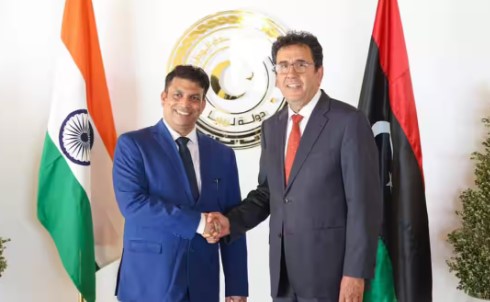Bharat has officially reopened its embassy in Libya, resuming operations more than five years after it was closed due to escalating security concerns in the North African nation.
The embassy, which had been functioning with minimal staff, was reopened under Libya’s National Unity Government based in Tripoli. The event was announced by the Bharat foreign ministry on Monday, with Mohammed Aleem designated as the new chargé d’affaires for the mission.
Libya’s foreign ministry shared on Facebook that Nouri Fadel Al-Kaseh, the director of the department of Asia and Australia affairs, met with Aleem to discuss the embassy’s reopening. Since the Bharat embassy’s closure in April 2019, the Bharat envoy to Tunisia had been managing relations with Libya.
The Bharat embassy in Tripoli will resume its key functions, including issuing visas to Libyan citizens and overseeing the employment conditions of Bharat expatriates. Both countries expressed a mutual interest in strengthening their friendly relations and enhancing cooperation in various areas.
Before the 2011 uprising against Muammar Gaddafi, around 18,000 Bharatiyas worked in Libya. Following the 2014 security crisis, approximately 3,800 Bharatiyas were repatriated, including six who had been kidnapped by ISIS.
The mission was temporarily relocated to Tunisia and then Malta, and resumed operations in Tripoli in 2012. However, due to deteriorating security, the embassy was again closed in 2019, maintaining only a minimal staff.
Despite ongoing security challenges, many Bharatiyas have returned to Libya through third countries in search of employment. Notable incidents include the kidnapping of seven Bharatiya workers in September 2020 and the evacuation of 27 Bharatiya workers from Benghazi in February 2022 with assistance from the International Organisation for Migration.
As of late 2022, around 3,000 Bharatiyas were reported to be in Libya, primarily blue-collar workers along with some professionals and Bharatiyas who have married Libyans. Libya remains divided between two rival administrations — the National Unity Government in Tripoli and the Government of National Stability based in the east — despite a ceasefire agreement in 2020 and the formation of the National Unity Government in 2021.

















